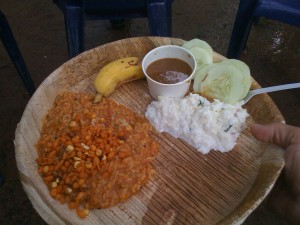
Natural/organic food mean to our lives and nature friendly, especially it reflects a responsiblity of producers for themeselves and for customers
(written and translated into English by Pan Sopheap, FNN)
Karnataka, India — Farmer and researcher representatives from 12 countries paid a 4-day field visits plus a one-day reflection workshop in Karnataka state, south of India, in order to expose ideas and experiences on food sovereignty.
The event hosted by Karnataka Rajya Raitha Sangha (KRRS), in cooperation with La Via Campesina (LVC) from November 2-6, 2011. The participants learned vast experiences from the Indian farmers regarding food sovereignty through application a method of Zero Budget Natural Farming and had also exchanged experiences with other participating countries.
Farmer leaders from 9 national level organizations in South and Southeast Asia, as well as 3 partner countries (researchers) from Latin America, Europe and North America shared their experiences and analysis of a common issues and challenges of the farmers and came up with some recommendations for the farmers, governments, inter-government bodies, and civil society organizations.
Among those participating countries were included India, Indonesia, Cambodia, Philippines, Thailand, South Korea, Timor Leste, Srilanka, Nepal, Mexico, Scotland and Canada.
Ms. Chey Siyat, FNN provincial chairperson of Kampot, and Mr. Pan Sopheap, FNN Director, participated in the exposure visit.
During the visit the participants have learned new experiences as follows:
1. Philosophy and concept of the Zero Budget Natural Farming.
2. Methods of making liquid compost “Jeevamrutha”.
3. How human being, plants, creatures and soil have mutually been reacted and inter-reacted to assure and guarantee a cycle of life.
4. Natural farming is very meaningful for health of human, soil, plant, and environment.
5. Application of multi-purposes farms and drip water system are effective for small farmers to guarantee and live their own lives.
6. The earth and the environment are considered as our mother and lives. If we destroy the earth and environment mean we destroy our mother and ourselves.
7. The zero budget natural farming (ZBNF) mean farmers are free from using chemical fertilizers/pesticides, external inputs, and spend less labors and water.
8. The most important interpretation is the ZBNF mean farmers are free from being slave on their own rice fields and labors. So, the farmers will become more independent and self-reliant key actors in terms of food security and food sovereignty.
9. Seed Bank or know as Gene Bank is another also extremely important for farmers to free themselves from slavery of the neo-imperialism.
Ms. Chey Siyat, during and after the visit, expressed her impression that the Natural Farming that Indian farmers have been applying is the same method and process of Organic/Ecological Farming that FNN members have applied. However, she added that the visit enrich her knowledge about how human being and nature can communicate through deeply investigation and observation. She praised some of the host farmers who have succeeded themselves through the ZBNF. She has promised to apply some of the learned experiences and will also replicate to her members.
However, we did not learn about the saving and credit cooperative, as what FNN members have been applying. So, we hope to that we can learn more and can share one among another in the future.
In recent decades, health problems, environment issues, soil depletion, climates changes become a hottest issue and most consideration. Just in recent years more countries and institutions put their strong consideration and efforts on the natural and organic farming systems. Up to date, many national and international companies actively sold their agricultural products, especially the fertilizers, with logos and brand names as NATURAL CHEMICAL FERTILIZERS, because they clearly understand about the needs of the farmers and customers. They are very actively advertising and promoting with un-honest manner. Most of the farmers and customers getting confuse and have tried with those new products.
In overall, in order to promote food security and food sovereignty, especially to free themselves from being a slave on their own rice field, small farmers must be committed to quit chemical fertilizer and pesticide. They have to maximize and effectively use their own local resources and inputs.



Comments are closed